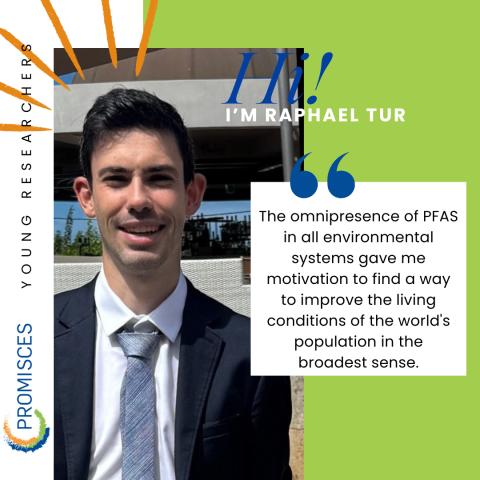PROMISCES Young Researchers: Raphael Tur
In PROMISCES, many young researchers are working in a wide variety of fields. But one thing they have in common: To enable a circular economy in the soil-sediment-water system and to fight PFAS. One of them is Raphael Tur. He is a PhD student at COLAS Environment (France). Working with PFAS made him aware of the major global problems surrounding PFAS and their dangers for humans and the environment.

Raphael Tur, PhD Student at COLAS Environment (France). @Raphael Tur
Do you think your work can have an impact on the world?
The aim of my work is to develop new chemical technologies for destroying per- and polyfluoroalkyl substances (PFAS). As these molecules have been widely used since the 1950s and are highly toxic to humans, the creation of new technologies to clean up these substances in the soil-water system could have an impact on the world. Their toxicity at low concentrations, high solubility and very high chemical stability make them a major and motivating challenge for a thesis project. The excitement of establishing new processes or optimizing known processes for the abatement of PFAS is also an additional motivation for the success of a thesis such as this.
Why did you choose to work in the field of PFAS research and why is this topic so important?
Before starting this thesis, I knew nothing about PFAS. The opportunity to work on this topic has made me aware of the major global problems surrounding PFAS and their dangers for humans and the environment. The omnipresence of these pollutants in all environmental systems (soils, waters, sea, air, farm, etc.) of the world gave me a supplementary motivation to meet this challenge and find a way to improve the living conditions of the world's population in the broadest sense.
Which impact do you think your research will have on the future?
My research will provide a better understanding of the destruction of PFAS under the operating conditions that we have developed.
Does working in PROMISCES have an impact on everyday life?
For the time being, it is impossible to pay any real attention to the objects we use daily that contain PFAS, because these substances are far too present in our everyday lives. However, working on this issue has helped to raise awareness among my close circle of the presence of these molecules in our daily lives and the dangers they pose.
